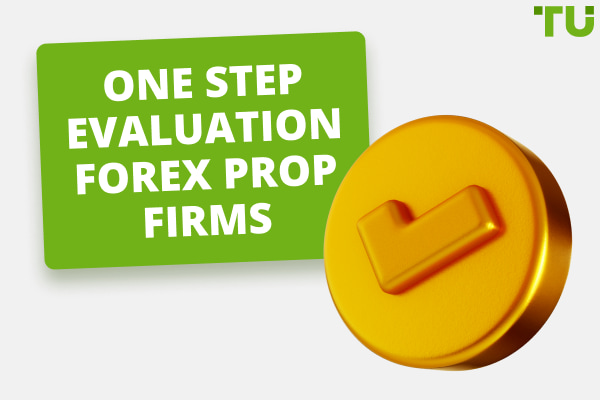5 Steps To Find A Job In Prop Trading
To increase your chances of landing a role at a prop trading firm, you should have a strong educational background and experience related to the role. You should then conduct research into the firms you’re interested in and select one to apply for. Next, prepare for the interview rigorously and once the interview is done, make sure to follow up.
Proprietary trading firms, or ‘prop firms’ for short, employ prop traders to manage their financial assets and actively trade using the firm’s capital to generate those profits. Because prop traders are required to consistently produce positive results, losing their position at the firm if they fail to do so, the job is extremely competitive. In fact, an estimated 95% of traders don’t manage to complete the challenges set by prop firms to determine their suitability for prop trading. In this article, Traders Union guides you through the five steps toward getting a job in prop trading.
Fund your account with SurgeTrader!How do I get a job in prop trading?
Prop traders are given access to massive amounts of capital, allowing them to execute much larger trades. They have the privilege of using advanced trading software and cutting-edge technology that’s often exclusive to prop trading firms. Prop traders also usually receive continuous education and training, while working flexible hours. To top it all off, they are given the opportunity to advance through a career that pays significantly more than your average 9 to 5 job.
If a job with a prop trading firm sounds appealing, you may be wondering – “How can I find a job as a prop trader?”. There are 5 steps you can take that will increase your chances of landing a prop trading job, which we will examine in more detail. You should:
-
1
Develop the right skills and experience
-
2
Research prop trading firms
-
3
Apply for jobs
-
4
Prepare for interviews
-
5
Follow up after interviews
Step 1: Develop the right skills and experience
One of the key factors assessed in the hiring process for prop traders is their educational background and their proven ability to successfully trade, which is best demonstrated through actual experience. Prospective prop traders should aim to have:
-
Education: A university degree is very important, though occasionally may be overlooked with the right experience. Degrees in computer science, math, physics, and statistics are typically prioritized, though qualifications from specialized technical programs such as engineering will also work in a prop trader’s favor.
-
Experience: Having experience either in prop trading or working with public financial markets goes a long way. Undertaking an internship with a financial firm is a great way to get hands-on experience for climbing the career ladder, while also networking with others in various financial industries.
-
Trading History: Overall returns should be considerably higher than losses and the record should show active trading for at least four to seven months. Prop firms considering a trader’s track record would want to see their trading history, number of trades executed, trade sizes, drawdowns, trade durations, and the P/L ratio. It should be noted that for a track record to make a difference, most prop firms expect extremely high returns exceeding as much as 70% in a single year.
-
Quantitative Skills: Quantitative trading is the process of using quantitative analysis involving mathematical computations, automated trading models, and comprehensive financial databases to identify trade opportunities. It’s typically used by financial institutions and hedge funds, though is becoming more common amongst individual traders.
Step 2: Research prop trading firms
Firms of varying sizes will operate in different financial markets using a number of trading styles, so you should aim for a firm that suits your experience, skills, and style. Make sure to research each firm rigorously when seeking employment. Factors you should consider about the firms include their:
-
Trading Style: Search for a firm that matches your trading style. Some firms will specialize in day trading for example, while others might opt for swing trading. Finding a firm that prioritizes trading styles which align with yours will increase your odds of succeeding in the application process.
-
Reputation: Keep an eye out for positive trader experiences and try to determine how their treatment of traders is reported on. Examine the firm’s past performance to see whether they have seen consistent growth, and how they have achieved their success, if any. Take into consideration how many years they have been operating for, as their experience and status (or lack of it) can be an indicator of their legitimacy.
-
Support: Look for firms that offer educational support and training. Access to educational resources, webinars, and mentorship programs can enhance your trading skills. Make sure to select a firm that is invested in the success and development of its traders.
-
Technological Edge: The more legitimate firms will offer access to cutting-edge technology that gives traders an advantage over most independent traders. Real-time market data, rapid trade execution, and advanced charting tools all packed into state-of-the-art trading platforms give prop traders a competitive advantage. Check if the technology used by your chosen prop firm matches your preferred trading tools or software.
-
Payout Structure: One of the most important considerations for many prop traders is of course the amount of money they can make. Most legitimate firms will offer a salary ranging anywhere from $144,000 to $250,000 per year (according to talent.com), with a percentage of generated profits also paid to traders, ranging from 20% to as much as 90%.
For a more detailed look at how to choose a prop trading firm, read Traders Union’s article How To Find a Prop Trading Firm.
Step 3: Apply for jobs
Next, you’ll want to apply for a job at your chosen firm. There are different ways to get into a prop trading firm, depending on the type of firm it is. If you’re looking to qualify for a funded account, where you trade remotely, you may be able to do so by completing a prop trading challenge. Otherwise, if going for an onsite role, take these steps to apply:
-
1
Prepare Your Resume: Create a specifically tailored resume that showcases your relevant experience, education, and skills in trading, finance, or other related fields. Highlight any quantitative skills, programming languages, or certifications you have.
-
2
Write a Cover Letter: Writing a compelling cover letter allows you to stand out from the possibly hundreds of other applicants. Make sure to emphasize your passion for financial markets, elaborate on your trading approach, and suggest why you might be a good fit for the firm based on your previous research on them.
-
3
Collate Track Record: If you have a trading track record, gather your performance metrics, such as returns, drawdowns, and risk management strategies to present to the firm. This data can be crucial in demonstrating your capabilities.
-
4
Apply Online: Visit the websites of your targeted prop trading firms and look for their career or recruitment sections. Follow their application instructions and submit your resume, cover letter, and any other required documents.
Step 4: Prepare for interviews
You’ll be assessed based on your experience, education, and personality, as is often the case in all job interviews. However, you may also need to demonstrate your abilities with math, take part in simulated trade scenarios, or even meet the trading team. To prepare for these stages you can:
-
Practice Common Questions: Practice answering regular interview questions, such as listing your strengths and weaknesses, detailing work challenges you’ve faced, and justifying why you want to work with the firm.
-
Test Mental Math: Prop trading interviews are notorious for presenting interviewees with challenging and unpredictable math questions and aptitude tests to see whether they can retain their focus and accuracy under pressure.
-
Be Yourself: Often in prop trading firm interviews, if a candidate passes the initial stages, they may have a group interview or meet their potential colleagues. Firms want to see if you’d be a good fit for the team, based on how you interact with them. The best advice here is to just be yourself.
Prop trading firm interviews are extremely competitive to the point of sometimes being anxiety-inducing. To ensure your maximum potential for success and prepare yourself as best as you can, read our Top 9 Tips for a Successful Prop Trading Interview.
Step 5: Follow up after interviews
Once the interview is done, there’s not much you can do other than play the (very tense) waiting game. To demonstrate your continued interest and professionalism, however, you could send a follow-up email within 24-48 hours of the interview.
You might consider emailing each person who interviewed you to thank them and reaffirm your interest. Show gratitude for their time and restate your enthusiasm for the position at the firm, briefly mentioning specific parts of the interview which stood out to you that highlight your suitability. You could declare your availability to clarify any information further, and politely inquire about an expected timeline for the decision-making process and next steps, unless it was specifically mentioned in the interview.
Tips for those looking for a job at a prop trading firm
If you’re searching for a job at a prop trading firm, here are some additional tips to make your search a little less daunting.
-
Networking: Developing relationships with professionals such as managers of a proprietary trading firms, traders, analysts opens up opportunities and expands your knowledge. You could network using social media platforms such as LinkedIn and Twitter, engaging with content from prominent figures and others related to prop trading or attend events related to the prop trading industry.
-
Persistence: It can be difficult to stay optimistic after failing an interview, but as the famous saying goes, “success is built on failure”. If you don’t succeed in your first prop trading job interview, there are plenty more opportunities available. In fact, the year-on-year search for prop traders has increased by 900% from 2022, meaning there is no shortage of prop firm jobs.
-
Your Fit: The work culture of a prop trading firm office is not for everyone. Though some traders will appreciate the decreased formality, lack of office politics, and flattened hierarchical structure of a prop firm compared to somewhere like a hedge fund or investment bank, there are also drawbacks.
If working for a prop trading firm sounds right for you, see our article on the best prop trading firms for 2023.
Conclusion
Overall, the process of becoming qualified for a prop trading firm through to applying and then interviewing for the job is an arduous one. While education and experience go a long way, there are also additional skills that will make individual candidates rise above the rest. Conducting thorough research into each prop firm and role is key, as is sufficiently preparing for the interview.
Although Traders Union can not guarantee that any of these tips will land readers a job in the prop trading industry, following them can only increase your chances. As always, make sure to conduct your own research where possible.
Best Prop trading firms
FAQs
What Are the Requirements For Prop Traders?
Prop traders should have a deep understanding of financial markets, know the importance of risk management and how to implement it, and have a proven successful trading strategy. A strong educational background and relevant experience are also important.
How hard is it to join a prop firm?
Given the stringent requirements for the job, quite hard. Competition in the application process is also high, and more than 95% of applicants do not pass the initial tests. Building a positive track record and gaining relevant experience can help hopeful prop traders to set themselves above others. In another article, Traders Union answers how hard it is to get into a prop trading firm.
Is prop trading a good career?
Yes. As well as offering the opportunity for career advancement, prop trading pays considerably well, with salaries ranging from $60,000 to $165,000 and averaging $100,000, according to Zippia.
How do I get hired by a trading firm?
The most mainstream way is to get a relevant degree and then apply for a job at one of the many prop firms available. You can also intern at a financial institution in a related industry, or successfully complete a prop trading challenge.
Glossary for novice traders
-
1
Broker
A broker is a legal entity or individual that performs as an intermediary when making trades in the financial markets. Private investors cannot trade without a broker, since only brokers can execute trades on the exchanges.
-
2
Trading
Trading involves the act of buying and selling financial assets like stocks, currencies, or commodities with the intention of profiting from market price fluctuations. Traders employ various strategies, analysis techniques, and risk management practices to make informed decisions and optimize their chances of success in the financial markets.
-
3
Prop trading
Proprietary trading (prop trading) is a financial trading strategy where a financial firm or institution uses its own capital to trade in various financial markets, such as stocks, bonds, commodities, or derivatives, with the aim of generating profits for the company itself. Prop traders typically do not trade on behalf of clients but instead trade with the firm's money, taking on the associated risks and rewards.
-
4
Risk Management
Risk management is a risk management model that involves controlling potential losses while maximizing profits. The main risk management tools are stop loss, take profit, calculation of position volume taking into account leverage and pip value.
-
5
Leverage
Forex leverage is a tool enabling traders to control larger positions with a relatively small amount of capital, amplifying potential profits and losses based on the chosen leverage ratio.
Team that worked on the article
Jason Law is a freelance writer and journalist and a Traders Union website contributor. While his main areas of expertise are currently finance and investing, he’s also a generalist writer covering news, current events, and travel.
Jason’s experience includes being an editor for South24 News and writing for the Vietnam Times newspaper. He is also an avid investor and an active stock and cryptocurrency trader with several years of experience.
Dr. BJ Johnson is a PhD in English Language and an editor with over 15 years of experience. He earned his degree in English Language in the U.S and the UK. In 2020, Dr. Johnson joined the Traders Union team. Since then, he has created over 100 exclusive articles and edited over 300 articles of other authors.
Mirjan Hipolito is a journalist and news editor at Traders Union. She is an expert crypto writer with five years of experience in the financial markets. Her specialties are daily market news, price predictions, and Initial Coin Offerings (ICO).












